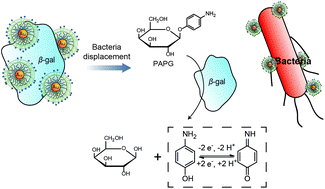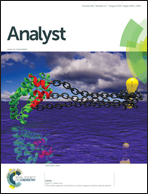Electrochemical nanoparticle–enzyme sensors for screening bacterial contamination in drinking water†
Abstract
Traditional plating and culturing methods used to quantify bacteria commonly require hours to days from sampling to results. We present here a simple, sensitive and rapid electrochemical method for bacterial detection in drinking water based on gold nanoparticle–enzyme complexes. The gold nanoparticles were functionalized with positively charged quaternary amine headgroups that could bind to enzymes through electrostatic interactions, resulting in inhibition of enzymatic activity. In the presence of bacteria, the nanoparticles were released from the enzymes and preferentially bound to the bacteria, resulting in an increase in enzyme activity, releasing a redox-active phenol from the substrate. We employed this strategy for the electrochemical sensing of Escherichia coli and Staphylococcus aureus, resulting in a rapid detection (<1 h) with high sensitivity (102 CFU mL−1).


 Please wait while we load your content...
Please wait while we load your content...